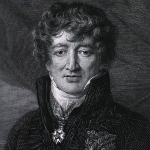Background
Henri Marie Ducrotay de Blainville was born on September 12, 1777, at Arques-la-Bataille, France. Son of Pierre Ducrotay and Marie Pauger de Blainville, Henri grew up among the lesser but intensely proud Norman nobility.

Henri Marie Ducrotay de Blainville was born on September 12, 1777, at Arques-la-Bataille, France. Son of Pierre Ducrotay and Marie Pauger de Blainville, Henri grew up among the lesser but intensely proud Norman nobility.
Henri's schooling, interrupted by the French Revolution, recommenced in Rouen and Paris, where he at first studied music, art, and literature. There followed a brief but spectacular dissipation of his patrimony. Reforming himself and pursuing his ferocious desire to learn, Blainville turned to medicine (Doctor of Medicine, Paris, 1808) and then to natural history.
Working in Georges Cuvier's laboratory, de Blainville soon became an outstanding comparative anatomist and developed further as a remarkably independent thinker. In addition to anatomy, he lectured and published widely on descriptive and taxonomic invertebrate zoology (particularly malacology), comparative osteology, history of science, and the first principles of natural history. About 1810 he began formal instruction (as Cuvier’s deputy) in various Parisian institutions (Athénée, Collège de France, Muséum d’Histoire Naturelle). He was named a professor at the Muséum in 1830 and in 1832 was appointed to Cuvier’s vacant chair of comparative anatomy.
Blainville’s influence was exerted principally through his famous lectures; he was a somewhat unsystematic author and brought few works to true completion. In 1813 he became a close acquaintance of Saint-Simon and, about 1824, the friend, disciple, and mentor of Comte, who carefully followed Blainville’s most notable lecture series, that on physiology. Félix Archimède Pouchet and H. C. M. Nicard were among Blainville’s pupils.
Henri de Blainville believed that natural order was simply the unfolding of the Creator’s design; that design in turn refocused our regard upon His wisdom and power. There were two roads to God, faith, and knowledge, and for Blainville they merged into a single Christian philosophy. Blainville was a believing and, it appears, a practicing Roman Catholic. His religion, however, aimed less at spiritual experience than at an understanding of God’s plan of creation, and thus was largely an elaboration on earlier objectives and beliefs of the deists.
Blainville’s grand and enduring trinity was God, king, and France. His distaste for egalitarian society and contempt for Republican ideals led him to examine alternative social structures and to discuss favorably various utopian socialistic schemes.
Blainvgille’s lifelong objective in natural history was order. Order in the chaos of existence necessarily could derive only from clearly defined principes. These would follow inevitably from what Blainville called la philosophie chrétienne.
God’s plan for ordering animals and plants was the long-familiar scale of being, or série. Blainville vigorously defended the generalized série against Cuvier’s attacks. Apparent gaps in the arrangement of existing organisms were nicely filled by fossil forms; Blainville carried out valuable paleontological research to support this proposition. Together, extinct and extant organisms testified to the original fullness, and hence rightness, of God’s creation. Such change as occurred, possibly including that of species, was predicated by the divine plan.
Man stood both morally and physically at the summit of the Série, presenting the standard by which the rank of all other forms was to be decided. Blainville followed Bichat in defining life as a general responsiveness of the organism to, and its persistence amid, ever-varying ambient conditions. This characteristic, Sensibilité, was to biology what gravitation was to the Newtonian world machine; whether causal or not, it gave meaningful substance to the essential fact of relation. Organs of relation (principally the sensory and locomotory parts) thereupon assumed primacy and allowed Blainville to base his intricate and numerous classifications upon external features, those which mediated with the environment.
In 1825 Henri was elected to the Académie des Sciences.
Henri's extreme personal and family pride led him to bitter relations with contemporaries and an unsympathetic view of bourgeois France.

Georges Cuvier helped de Blainvillein to get the position of assistant professor of anatomy and zoology in the Faculty of Sciences at Paris. Eventually, relations between the two men soured, a situation that ended in open enmity.


